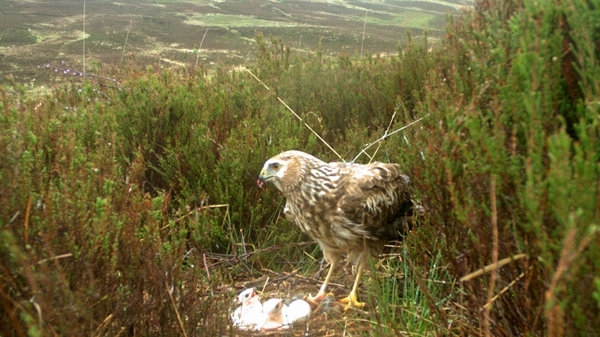
THE Moorland Association and the Game & Wildlife Conservation Trust (GWCT) are celebrating the most successful hen harrier breeding season in England for over a decade.
Key to this success has been an unprecedented 21 chicks fledged from land managed for grouse shooting; over 60% of this year’s young (34). Last year, there were no nests on grouse moors and only three successful nests across all of England that raised just 10 chicks.
Defra’s initiative to unlock the complex conflict between hen harriers and grouse shooting, and allow both to thrive, is beginning to work. Trials of a revolutionary harrier management licence to get more harriers on English moors has been key. However, activists opposed to shooting are attempting to crush this early success by trying to have the licence revoked before trials are completed.
Hen harriers are notoriously poor survivors in the first year with natural mortality affecting about seven out of every ten birds and now the recovery of this red listed species is being placed in jeopardy by those more interested in expensive legal action over conservation.
Amanda Anderson, director of the Moorland Association, said: “We are delighted that 34 harriers have fledged from the English uplands with a much-improved range. Grouse moor managers and their gamekeepers are to be congratulated for their involvement in eight of the breeding attempts resulting in five successful nests on moorland managed for red grouse across Lancashire, Derbyshire and North Yorkshire. Yet, certain organisations and individuals are intent on doing whatever it takes, including wasting court time and taxpayers’ money, to prevent a successful outcome.”
Andrew Gilruth, director of communications at the GWCT, said: “The RSPB must be congratulated for insisting that Defra produced a hen harrier recovery plan that had the full support of the grouse moors. For decades, nest protection was never enough, now we are seeing the success of working with landowners to resolve wildlife conflicts. Activists objecting to these government plans should focus on what is best for the harrier.”
Get the latest news delivered at 9am every weekday morning
Sign up for our Morning Briefing to receive daily email alerts containing all the latest conservation and fieldsports news from a wide range of sources.
Each morning we scour the internet, newspapers and social media for the latest stories and opinion pieces that may have a direct impact on the GWCT and its members.
We then compile them in an easy-to-read email and send them to our readers at 9am. Sign up now to start receiving your essential Morning Briefing:
*You may change your mind any time. For more information, see our Privacy Policy.
Notes to editors
The Game & Wildlife Conservation Trust – providing research-led conservation for a thriving countryside. The GWCT is an independent wildlife conservation charity which has carried out scientific research into Britain’s game and wildlife since the 1930s. We advise farmers and landowners on improving wildlife habitats. We employ more than 60 post-doctoral scientists and other research staff with expertise in areas such as birds, insects, mammals, farming, fish and statistics. We undertake our own research as well as projects funded by contract and grant-aid from government and private bodies.
For information, contact:
Eleanor Williams
Telephone: 07592 025476
Email: press@gwct.org.uk